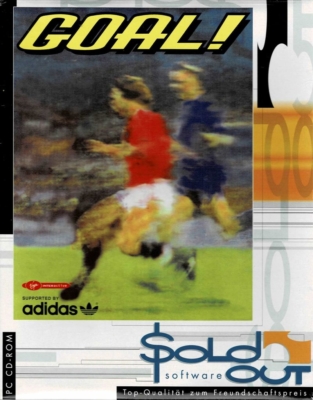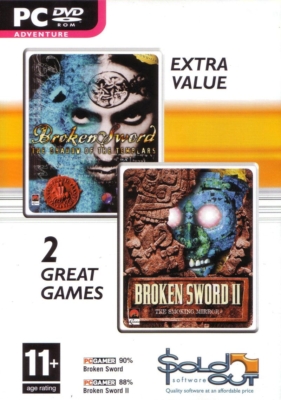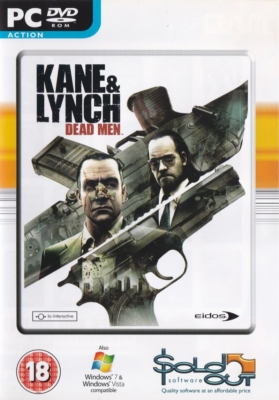Inside The Big Cardboard Box is where we delve into the history of the largely defunct world of boxed PC games, with a particular emphasis on all the ones I used to own, but later gave away or sold.
Sold Out was the budget range that heralded a new era of decent PC games at even lower prices. And, just as The White Label had previously captured the imagination by releasing the once-mega-expensive £70 FMV game The 7th Guest at the £10-15 mark, Sold Out did the same by including it among their first few releases in 1997. Even though, by that point, the gloss of the FMV adventure had begun to fade somewhat, it still sent a message that Sold Out wasn’t going to be about bargain basement rubbish.
There was some of that, much later on, but mainly as a by-product of there being something of everything, once the label really picked up momentum. And the journey of The 7th Guest to this new lower price point, via an initial budget release, arguably established a pattern that ultimately impacted the success and longevity of the mid-range budget labels, as their main market – people who liked a bargain – figured that they could always wait for a further reduction.
The other impact was the trade-off people were prepared to make for low prices: no-frills presentation, with a box that was empty except for a disc which held a copy of the manual as well as the game.
Sold Out straddled the big box and DVD case eras, with early releases coming in a full size box containing a cardboard CD sleeve. The 7th Guest aside, they were perhaps a little long in the tooth to really set pulses racing: early 90s DOS titles like Dune, Lure of the Temptress, Warcraft: Orcs & Humans and Goal! Still, a bargain is a bargain [is it? – a reader], and I still have my copies of the last two somewhere.
But, as things progressed, a mixture of newer and more high-profile titles secured the label’s place in the market. Squad shooter Spec Ops made a fairly swift transition from full price down to £5, while 90s classics like Grand Theft Auto and Tomb Raider were also soon added to the range.
Such was the prolific nature of the label during the 00s, tracking its history in detail, and plucking out memorable titles – or ones I used to own at least, which is part of the motivation in raking through these release histories – seems like an overwhelming task. There’s a list on MobyGames, but I couldn’t shake the feeling that it somehow doesn’t seem complete, without necessarily being able to name a single specific game that’s missing.
At times, it seemed as if every half-decent title that had a chance of selling would end up on Sold Out after a couple of years, and new games were constantly being added. This was the era, of course, when boxed PC games were still sold in high-street shops (and high-street shops were still things that existed), and the likes of GAME would offer a ‘Buy two, get one free’ type deal, with three Sold Out titles for £10.
Most of the time there’d usually be two games in the deal that you actually wanted, but with a third effectively free, you could end up (as with modern bundle key sellers like Fanatical) taking a punt on something that you would likely be terrible at or ultimately would end up not playing. Still, I do remember a good few lunch hours and shopping trips in the 00s involving at least a few minutes each time agonising over a potential bargain.
All of this was despite the fact that at one time Sold Out offered the same 3 for £10 deal via mail order and free postage, with the full range available, rather than whatever your local branch had on the shelves. Plus, anyone getting rid of any unwanted Sold Out games would do so for even cheaper on eBay, or via CeX, further increasing opportunities for the bargain hunter.
I don’t think I tended to get rid of too many Sold Out titles, as the packaging could always be discarded and the disc retained in a wallet. But there were so many ins and outs – lunch hour purchases from GAME or CeX on the one hand, and guilt-ridden Cupboard of Shame clear-outs on the other – that it’s really hard to say for certain. Looking at my CD wallet now, I’m as baffled by the selection as I am by the list on MobyGames: it doesn’t seem quite right, but I can’t explain why.
There is clear evidence on FFG of some kind of mini-purge in 2012, although it looks as if my attempts to sell my copies of Anachronox (sorry Stoo), Alone in the Dark: The New Nightmare and Prisoner of War were unsuccessful, although I don’t have them now, though, so assume they went to the local charity shop instead. (There’s also evidence on this site of me finding a Sold Out game in the house that I had no recollection of ever buying.)
I’m fairly sure that Desperados and Commandos 2 were once part of my collection (the first Commandos game was another popular early release that quickly made its way to the label): if I remember rightly, one slightly unwelcome feature of the brand as time wore on was the addition of a rather clunky Sold Out installer menu which would sometimes get in the way of the original setup files, and I have a vague memory of this not agreeing with 64-bit Windows. Either way, rock-hard 2D strategy games were probably a bad idea in the first place.
Double packs were a brief addition to the range: Carmageddon 2/Carmageddon: TDR 2000 is one I still have in the collection, while I have some (possibly erroneous) recollection of owning a bundle of the first two Broken Sword games at one point. And genuine rubbish was fairly rare: I don’t know that the Army Men games were ever particularly well received, and there were a few tycoon and management type games that snuck on there, but otherwise it was a range that did what it said on the tin: good games at bargain prices.
Ultimately, the challenge of competing with Steam and digital distribution in general proved to be a bit too difficult, especially when combined with those facing the high street and wider world at the end of the 00s. I would still pick up Sold Out boxes occasionally, and another one that’s still on my shelves, Kane and Lynch: Dead Men, was one of the last releases to hit the label, according to that MobyGames list.
The Sold Out name was just part of Mastertronic, who also offered other higher-priced lines including a ‘PC Gamer Presents’ (boo) range, which bizarrely included games that the magazine hadn’t even rated that highly. Once the Sold Out series was retired, the name was repurposed, and exists now as a standard publishing label, with no budget aspirations or mention of their prior history.
Probably more than any other budget label, many of my reviews on FFG have been from Sold Out re-releases, and I was grateful, both as a teenager and through my 20s, for access to a cheap source of a wide variety of games in the 90s and 00s. And arguably flooding the market with re-badged copies of so many games has helped from a preservation point of view, too.
Unfortunately, though, when it comes to trying to remember which Sold Out games I owned and got rid of (and preferably whether any of them were in that big cardboard box from 2002) – I’m none the wiser and, if anything, more confused than ever. Dammit!
—
NB: All scans sourced from MobyGames.






 Posts
Posts
I had a quick look through my Gaming CD Wallet and found: red alert 2, empire earth, freedom force, Heroes of Might and Magic 3, Heroes of the pacific, sacrifice, simcity 3000, UFO Enemy Unknown. That last one must have been one of the first relases on this label.
A little surprised there weren’t more, back from those mid-2000s glory days of budget deals at my local GAME.
August 6, 2021 @ 10:18 am
UFO was apparently 1998, and still in the big box era at least. (A bit surprised you didn’t have this one before it went to Sold Out? Unless it was a sell/re-buy later situation?)
My boxed games are still in crates waiting to be unpacked… but I think I’d fallen into some kind of bizarre two-tier system where some budget games went on the shelf while others were relegated to the wallet.
Looking in the latter, it’s mainly stuff I’ve reviewed: XIII, Carmageddon II/TDR 2000, Hostile Waters, Colin McRae 2.0 and 3, Omikron: The Nomad Soul, TOCA Race Driver 1 and 2, Pool Paradise, Rally Championship Xtreme, The Italian Job… plus one or two others like The Thing and Daikatana.
There are more somewhere – I’m sure I also had Heroes of the Pacific at one point (and maybe still do?!)
August 7, 2021 @ 11:53 am
It wasn’t until Sold Out that I actually owned a legit copy of UFO, before that I’d copied someone elses’ disks. Actually I first played it on another friend’s Amiga. (painfully slow compared to running on a 386).
I realised I have no memory of buying Heroes of the Pacific; maybe you gave me your copy?
August 8, 2021 @ 9:07 pm
Ah, turn-based strategy on an Amiga! I imagine you had to make a cup of tea while the computer took its turn.
With the lack of SoundBlaster and slightly chunkier graphics I always thought my Dad’s office 386 a little inferior to the Atari ST, until we put Championship Manager on it and the 30 minute wait to set up the leagues on the ST was done in seconds…
At the risk of turning this into ‘two 40 year old men try to remember where they left things’ I do remember talking about swapping a few games at one point, although part of me does think I still have Heroes of the Pacific somewhere? Although I’m not tackling that pile of boxes just yet…
August 9, 2021 @ 10:07 am